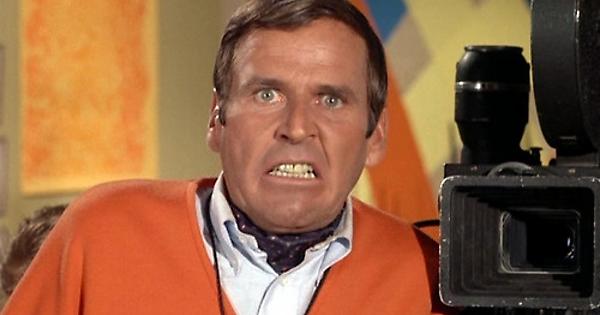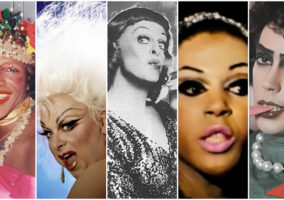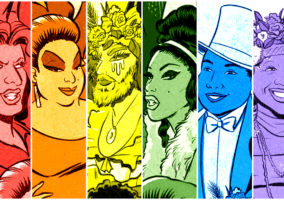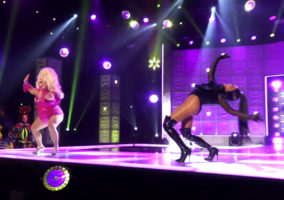
In the original proposal for our book – and through several drafts of the manuscript – the chapter on Drag Race’s Snatch Game challenge had a very different focus. We’re happy with our decision to turn that chapter toward the long history of celebrity female impersonation drag, allowing us to focus on some of our long-held faves like the legendary Charles Pierce, but our original frame for the chapter wasn’t drag queens; it was first conceived as a tribute to the sissymen of seventies game shows; one of whom reigns above all others: the legendary Paul Lynde, famous for over 700 appearances as the center square on the long-running game show Hollywood Squares.
But his career extended far beyond the boundaries of his game show cube. He got his start on Broadway and rose to prominence for his role in both the stage and film versions of Bye-Bye Birdie. But to the gays, he’s iconic for his recurring role as Uncle Arthur on Bewitched; a performance that would lock in his public persona far more accurately than the harried suburban father of Bye-Bye Birdie.
Gregariously obnoxious, flamboyantly funny, and irresistibly hilarious, Lynde’s “Uncle Arthur” was a beacon of barely hidden queerness to a generation of latter Baby Boomer gayboys.
When he took the chair on Hollywood Squares in 1966, his bitchy, bawdy, lightly flamboyant persona was well established. At a time when most of the television-viewing audience preferred their queer entertainers to maintain a veneer of heterosexual respectability (and homo deniability) like Liberace and Johnny Matthis, (and later Elton John and Freddie Mercury) Lynde’s Kleenex-thin closet door was broadcast into the living rooms of middle America on a nightly basis. From today’s perspective, with its openly gay talk show hosts, drag queen Emmy winners, and transgender pop stars, Paul Lynde’s public persona of implied-but-never-stated queerness while slinging jokes for straight audiences could uncharitably (and we’d maintain inaccurately) be seen as some sort of queer minstrel act. He never quite broke out of his game show superstardom in the way he would have likely preferred, given his career trajectory. He made several stabs at variety television and sitcom stardom, but it never quite happened for him, even though he was an extremely popular TV personality. To be fair, his Halloween special of 1976 has become something of a camp classic among the vintage TV-watchers.
But there’s reason to believe the pressure of living as a queer-presenting man on television at a time when queerness was reviled (not to mention outlawed) took its toll on his private life; especially since his queerness almost certainly had a part in his inability to broaden his career past game show appearances. He was known to be even more acid-tongued in his private life as he was on television – and quite a bit crueler. He struggled with alcoholism and substance abuse throughout his adult life and was arrested for public intoxication more than once. He died of a reported heart attack at the age of 55 in 1982.
We so wanted to pay tribute to him in our book, because we think he contributed tremendously to the slow normalization of homosexuality in the public sphere and because we don’t think he gets a fraction of the credit he deserves, not only for being so bold at a time when virtually all of his celebrity cohorts were going to great lengths to hide their queerness, but for the toll that boldness took on him. His name never comes up when people list the great queer pop culture figures and that’s always struck us as hugely unfair to him. It’s hard sometimes to see what trailblazers our forebears were if we don’t take the time and effort to place them in the context of their times. It may seem like nothing at all for a sassy, bitchy gay man to make gay sex double entendres on the most mainstream of television shows, but it really was an outrageously brave and revolutionary thing to be in the years surrounding Stonewall.
The reason we’re bringing this up now (aside from using the opportunity to remind you of our extremely well-reviewed book, that is)? Because Paul Lynde may be getting his long overdue elevation and it’s coming at the hands of the one celebrity who simply couldn’t be better-suited to give him the kind of portrayal he deserves. Billy Eichner, who knows a thing or twenty about launching a career as an obnoxiously funny gay man, is giving Paul Lynde the biopic treatment:
DEADLINE: Paul Lynde was a very funny actor, but what about him made this worth movie treatment for you?
EICHNER: There’s some overlap, between Paul and I, in that we both had our breakthrough in the industry, as performers, presenting a rather larger-than-life, flamboyant, gay persona on screen. Even though I was always very out, Paul was never technically out. But he was as out as you could be, at that time, in that he was clearly leaning into a flamboyant persona. Unlike Rock Hudson, and Tab Hunter, and Cary Grant, and all these other actors, he wasn’t pretending to be straight. You didn’t see him getting set up on dates with women, or having phony relationships with women, to try to present to the world as a straight man. I think that was very admirable, for the time, and also, if you look at those jokes on Hollywood Squares, he comes as close to admitting he’s gay as you possibly can. He’s making thinly veiled, at best, references to gay sex, to finding men attractive, to swinging both ways. It’s not even subtle, and rather bold for the time. That wasn’t some underground, indie film being shot in New York; it was as mainstream as you can get. Hollywood Squares was a huge hit, always in the top 10 or 20 shows, for over a decade. It made him a very famous, wealthy person.
In other words: this bitch gets it. As well he might, since Eichner managed what Lynde couldn’t: he broke past his initial schtick and the limited confines of his Billy on the Street show to launch a successful acting career as an openly gay man. Under different circumstances, we might wrinkle our noses at the lead actor’s total lack of resemblance to the person they’re playing, but Eichner really is uniquely suited to understanding Lynde’s persona and he’s been making some excellent points in the press about the importance of letting gay people portray their kind in films like this because many of them will have an innate understanding of the subject’s actions and the feelings that caused them to take them. We don’t know Billy Eichner, but we think he’s perfect for shining a light on the bitchy queen archetype and the feelings of insecurity that tend to fuel it. Besides, if we wanted a strict impersonation of the man, we could always watch Ben de la Creme play him perfectly on Snatch Game:
“Our book Legendary Children: The First Decade of RuPaul’s Drag Race and the Last Century of Queer Life is on sale now!
The Los Angeles Times called it “a nuanced exploration of the gender-bending figures, insider lingo and significant milestones in queer history to which the show owes its existence.” The Washington Post said it “arrives at just the right time … because the world needs authenticity in its stories. Fitzgerald and Marquez deliver that, giving readers an insight into the important but overlooked people who made our current moment possible.” Paper Magazine said to “think of it as the queer education you didn’t get in public school” and The Associated Press said it was “delightful and important” and “a history well told, one that is approachable and enjoyable for all.”
Yea or Nay: Christian Louboutin “Mondiri” Sandals Next Post:
Tatsuya Tanaka’s Miniature Calendar
Please review our Community Guidelines before posting a comment. Thank you!



